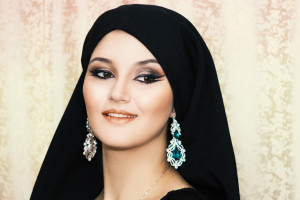
A muslim girl in hijab
Hijab Row
 By Shankar Raj
By Shankar Raj
Bengaluru: The Karnataka government categorically stated before the High Court that the hijab is not an essential religious practice of Islam. Preventing its use did not violate Article 25 of the Indian Constitution, which guarantees religious freedom.
Meanwhile, the late Lata Mangeshkar ‘came’ into the picture when a petitioner in public interest litigation prayed to the full bench of the Karnataka high court to allow Muslim girls to sport hijab at least on Fridays (Jumma day) and also during the upcoming Ramzan month.
“Kuch paakar khona hai, kuch khokar paana hai” (Let us gain something while losing, let us lose something while gaining),” petitioner Dr Vinod G Kulkarni, consulting neuropsychiatrist and social activist from Hubballi, quoted from Lata Mangeshkar’s hit song ‘Ek Pyar Ka Nagma Hai’ from the 1972 movie Shor, while pressing for interim relief. Chief Justice Ritu Raj Awasthi, heading the full bench, said they will consider it.
Commencing his arguments in reply to the PIL and a bunch of petitions from Muslim girl students, Advocate General Prabhuling Navadgi told the court: “My first submission is that the order is in consonance with the Education Act. Second is the more substantive argument that the hijab is an essential part. We have taken the stand that wearing of hijab does not fall within the essential religious practice of Islam. Third is that the right to wear hijab can be traced to Article 19 (1) (a). My submission is that it does not do so.”
The AG also told the full bench of the High Court comprising Chief Justice Ritu Raj Awasthi, Justice JM Khazi and Justice Krishna M Dixit that the February 5 order (banning the hijab in pre-university colleges) of the state government was in accordance with the law and there was nothing to object in it.
Also read: Students defy Karnataka High Court order; attend schools wearing hijab
The High Court, in its interim order pending consideration of all petitions related to the hijab row, last week restrained all the students from wearing saffron shawls, scarves, hijab and any religious garments within the classroom.
“There is no issue of hijab in the government order. The government order is innocuous in nature. It does not affect the petitioners’ rights,” he said, adding that colleges can decide if they want to allow the hijab in the classroom.
“Conscious stand of the state is that we do not want to intervene in religious matters. We could have said the hijab was against secularism and order and could have said it is not permissible. We have not. It is a stated stand of the state that we did not want to intervene,” he said.
At the same time, he admitted that the portion prescribing clothes “in consonance with unity and equality” could have been worded better.
“Here the draftsman went a bit enthusiastic. What was meant was, in case no uniform is prescribed, please wear decent clothes. I agree it could have been worded better,” he said.
Meanwhile, protests and demonstrations in PU and degree colleges over the issue of wearing hijab inside classrooms have spread to new colleges and districts on Thursday. In a few colleges, boys too boycotted classes.
*Shankar Raj is former Editor of The New Indian Express, Karnataka and Kerala, and writes regularly on current affairs.





